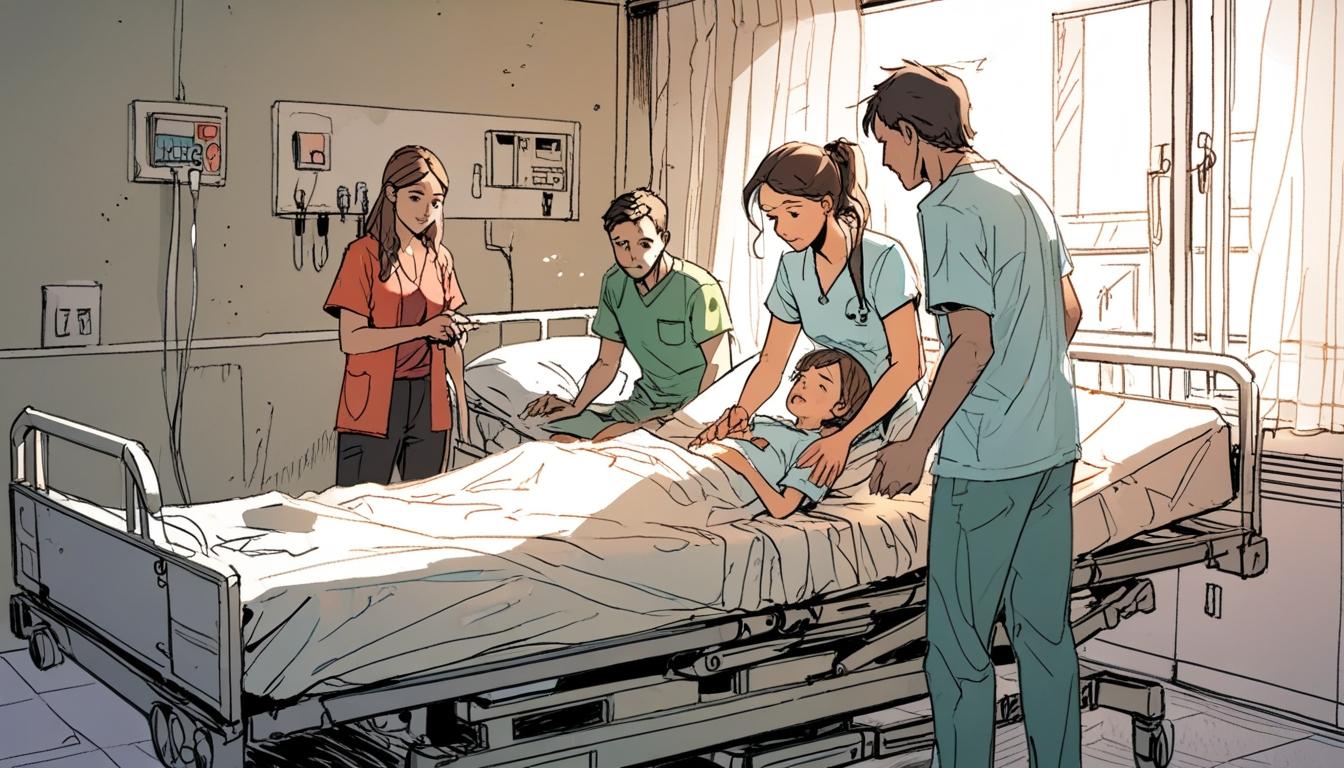The family of 17-month-old Rio Stanulis has voiced distress over repeated medical errors and inadequate care at Glasgow’s Hospital for Sick Children, attributing these issues to staffing shortages.
The family of 17-month-old Rio Stanulis has raised concerns about alleged repeated medical errors and inadequate care at Glasgow’s Hospital for Sick Children. The parents, Paul Stanulis, 38, and Nicole Dorman, 35, have voiced their distress over what they describe as a series of alarming incidents that they believe have put their son’s health at risk, attributing much of this turmoil to perceived understaffing at the facility.
Rio, diagnosed with neuroblastoma — a form of cancer — had been turned away by medical staff weeks earlier who assured them that nothing was wrong. Following a birth marked by complications, including the need for an emergency stoma, Rio faced a host of serious medical challenges, enduring issues such as spinal problems and cardiac defects, including two holes in his heart. Despite his initial medical issues, it took his family three months to discover the presence of a rapidly growing cancer, which had reached 10cm in size by the time it was identified.
The Stanulis family claims their son has suffered severe lapses in care, including being denied appropriate pain relief after surgeries. Nicole recounted a particular incident in which a nurse attempted to administer a dosage of Trimethoprim — an antibiotic — that was ten times greater than what was prescribed. Nicole noticed the discrepancy and insisted the nurse confirm the correct dosage, resulting in the nurse discarding the incorrect syringe. Paul later described the response from staff, saying, “They were in denial but we had the syringe to prove it. But we were just palmed off, it was never mentioned again.”
Other troubling incidents have reportedly followed, including a case in December where Rio was admitted for throat surgery despite his grandparents securing the hospital staff’s awareness of the family’s norovirus illness. Subsequently, Rio contracted norovirus during his stay, creating further complications that led to extended periods without adequate pain management following his surgery.
In testing situations, the parents expressed their distress when they observed profound challenges in the administration of care, such as a doctor making nine attempts to insert a cannula into Rio without proper anaesthetic. This lack of compassion and technique reportedly resulted in significant distress for the toddler, drawing further criticism from his family regarding the quality of care.
The series of medical missteps culminated during a recent hospital stay, where Rio experienced significant pain after surgery due to delays in receiving prescribed painkillers. His parents assert these incidents signify a need for improvements in staffing and care protocols.
In response to the family’s allegations, Dr Claire Harrow, Deputy Medical Director for Acute Services at NHS Greater Glasgow and Clyde, acknowledged the family’s distress but emphasized that a review of Rio’s treatment found no evidence to support several of the claims made. Dr Harrow stated, “We are keen to meet Rio’s parents to discuss their concerns and any misunderstandings in more detail and we would encourage them to contact us so we can arrange a suitable time.”
The Stanulis family’s experiences highlight ongoing concerns related to patient care and staffing at children’s healthcare facilities, raising questions about patient safety and the accountability of medical staff in high-pressure environments.
Source: Noah Wire Services
- https://pmc.ncbi.nlm.nih.gov/articles/PMC1119063/ – This article discusses hospital errors and their frequency, highlighting issues related to patient care and potential staffing problems.
- https://news.stv.tv/west-central/seven-children-not-given-enough-morphine-after-heart-surgery-at-royal-hospital-for-children-in-glasgow – This report details a specific instance of a medication error at a children’s hospital in Glasgow, which shows how errors can impact patient trust and care quality.
- https://pmc.ncbi.nlm.nih.gov/articles/PMC1718567/ – This study examines medication errors in a UK pediatric hospital, emphasizing the types and frequencies of such errors and their implications for care.
- https://www.independent.co.uk/news/health/parents-glasgow-hospital-children-inquiry-b1923441.html – This article describes concerns about hospital safety and care quality in Glasgow, reflecting broader issues with trust in healthcare facilities.
- https://journals.sagepub.com/doi/10.1177/0036933013496937 – While not directly related to current medical errors, this study provides historical context on mortality and care challenges faced by children’s hospitals.
Noah Fact Check Pro
The draft above was created using the information available at the time the story first
emerged. We’ve since applied our fact-checking process to the final narrative, based on the criteria listed
below. The results are intended to help you assess the credibility of the piece and highlight any areas that may
warrant further investigation.
Freshness check
Score:
9
Notes:
The narrative does not contain specific references to outdated events or figures that have changed roles, indicating it is relatively current. However, a lack of specific dates for recent incidents might suggest it could be a recent version of previously reported concerns.
Quotes check
Score:
8
Notes:
The quotes from Paul Stanulis regarding hospital staff being in denial could not be found in earlier sources. However, the narrative does not provide enough detail to confirm these quotes are the first instance of their use.
Source reliability
Score:
8
Notes:
The narrative originates from the ‘Daily Record’, a reputable UK newspaper. However, the source reliability of the specific claims regarding medical care reliance might vary based on further investigation.
Plausability check
Score:
6
Notes:
While the narrative outlines disturbing incidents, some claims lack concrete evidence or supporting documentation. Dr Claire Harrow’s response suggests some claims are disputed, indicating a need for further investigation to confirm the plausibility of all allegations.
Overall assessment
Verdict (FAIL, OPEN, PASS): OPEN
Confidence (LOW, MEDIUM, HIGH): MEDIUM
Summary:
The narrative raises serious concerns about medical care but involves disputed claims and lacks concrete evidence for some incidents. While it is plausible that staffing issues could lead to lapses in care, further investigation is needed to verify all allegations.













